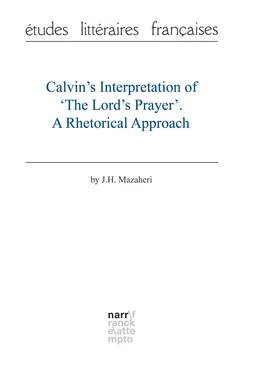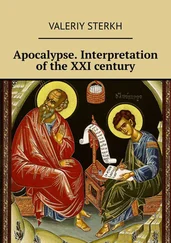Professor J.H. Mazaheri - Calvin's Interpretation of 'The Lord's Prayer'. A Rhetorical Approach
Здесь есть возможность читать онлайн «Professor J.H. Mazaheri - Calvin's Interpretation of 'The Lord's Prayer'. A Rhetorical Approach» — ознакомительный отрывок электронной книги совершенно бесплатно, а после прочтения отрывка купить полную версию. В некоторых случаях можно слушать аудио, скачать через торрент в формате fb2 и присутствует краткое содержание. Жанр: unrecognised, на английском языке. Описание произведения, (предисловие) а так же отзывы посетителей доступны на портале библиотеки ЛибКат.
- Название:Calvin's Interpretation of 'The Lord's Prayer'. A Rhetorical Approach
- Автор:
- Жанр:
- Год:неизвестен
- ISBN:нет данных
- Рейтинг книги:4 / 5. Голосов: 1
-
Избранное:Добавить в избранное
- Отзывы:
-
Ваша оценка:
- 80
- 1
- 2
- 3
- 4
- 5
Calvin's Interpretation of 'The Lord's Prayer'. A Rhetorical Approach: краткое содержание, описание и аннотация
Предлагаем к чтению аннотацию, описание, краткое содержание или предисловие (зависит от того, что написал сам автор книги «Calvin's Interpretation of 'The Lord's Prayer'. A Rhetorical Approach»). Если вы не нашли необходимую информацию о книге — напишите в комментариях, мы постараемся отыскать её.
Calvin's Interpretation of 'The Lord's Prayer'. A Rhetorical Approach — читать онлайн ознакомительный отрывок
Ниже представлен текст книги, разбитый по страницам. Система сохранения места последней прочитанной страницы, позволяет с удобством читать онлайн бесплатно книгу «Calvin's Interpretation of 'The Lord's Prayer'. A Rhetorical Approach», без необходимости каждый раз заново искать на чём Вы остановились. Поставьте закладку, и сможете в любой момент перейти на страницу, на которой закончили чтение.
Интервал:
Закладка:
had warned him, sent down Hermês Argeiphontês,
our most observant courier, to say:
‘Don’t kill the man, don’t touch his wife,
Or face a reckoning with Orestes
The day he comes of age and wants his patrimony.’
Friendly advice—but would Aigísthos take it?
Now he has paid the reckoning in full.7
So Calvin highly regards the Greek thinker Socrates, his disciple Plato, as well as the poet Homer, and believes that Jesus was present in them as they talked about their gods in such a way. Speaking of Plato’s conception of prayer, he writes—even though the Second Alcibiades may not have been written by Plato himself, but a fact that which was not known by Calvin and his contemporaries:
Enquoy il a bonne opinion comme peut avoir un homme Payen, d’autant qu’il voit combien il est dangereux de requérir à Dieu ce que nostre cupidité nous enseigne. Et pareillement monstre assez nostre mal-heur en ce que nous ne pouvons pas sans dangier ouvrir la bouche pour rien demander à Dieu, sinon que le sainct Esprit nous conduise à la droite forme de bien prier (Rom. 8, 26). Et d’autant plus ce privilège mérite-il d’estre prisé de nous, que le Fils de Dieu nous suggère quasi les parolles en la bouche, lesquelles délivrent nos esprits de tous scrupules et doutes. ( Institution III, xx, 34, 377)8
We could deduce from these lines that to the Reformer Jesus was present in Plato and Socrates when they thus talked about their god. Moreover, we note that in his Latin version of the Institutes he uses the Latin equivalent of Zeus, Iupiter , to name God—which is what the American translator (Ford Lewis Battles) has taken into account—but in his French version he just uses the term “Dieu”. This reveals in Calvin a very broad and tolerant view of religion, which later leads other theologians to a better understanding of other religions and ecumenical thought. Therefore, when Jesus appears in person in a concrete way, the understanding of God becomes complete. Before this historical event, the Holy Spirit showed the right way to humans, but of course that was not sufficient. The Son had to come, or the Word becoming Flesh (John 1:1). Anyway, a Socrates was unconconsciously quite close to Christianity, for the Holy Spirit was with him, but he could not go as far as a Paul did, to whose Epistle to the Romans Calvin also refers in this passage. Paul, who saw God when he converted, writes about the Holy Spirit that it “helps us in our weakness; for we do not know how to pray as we ought, but that very Spirit intercedes with sighs too deep for words” ( Romans 8: 26).
VI. The Division of the “Lord’s Prayer” into Six Petitions
Luther had divided the “Prayer” into seven requests, explaining that “the first, second, and third petitions deal with the highest benefits that we receive from Him,”1 whereas “In the other four petitions we meet the needs that apply to our own daily life and to this poor, weak, and temporal existence” (Luther, The Sermon on the Mount 146). The Sixth Petition being, “Lead us not into temptation,” is clearly distinguished from the seventh, “But deliver us from evil.” The former, Luther points out, “is brought on by the fact that we are living on earth, amid all sorts of temptation and trouble, with attacks from every side. (…) We ask Him, therefore, to sustain us in the midst of this danger and need so that it does not overcome and destroy us” (Luther, The Sermon on the Mount 147). On the other hand, the Seventh Petition, clarifies the German theologian, “is that He would ultimately deliver us completely from all evil, and when the time comes for us to pass out of this life, that He would bestow upon us a gracious and blessed hour of death” (Luther, The Sermon on the Mount 147).
We note that Luther’s understanding is close to that of Augustine, who provides the following reason for the number seven: “The sevenfold number of these petitions also seems to me to correspond to that sevenfold number out of which the whole sermon before us has had its rise.”2 It is a vague explanation though, because neither the Beatitudes, nor the entire Sermon on the Mount could be easily divided into seven. Augustine and Luther subconsciously wanted the petitions to be sevenfold because of the sacredness attached to number Seven. The examples abound in the Bible. A very important one is when “Peter came and said to him: ‘Lord, if another member of the church sins against me, how often should I forgive? As many as seven times?’ Jesus said to him, ‘Not seven times, but, I tell you, seventy-seven times” (Mat 18: 21–22). Jesus is alluding to the First Book of Moses, where the Lord declares: “Whoever kills Cain will suffer a sevenfold vengeance” (Gen 4: 15).
But according to Calvin, there are only Six Petitions in the “Lord’s Prayer”. As early as the first Latin edition (1536) and the first French edition (1541) of the Institutes , he shows in the following explication his difference from Luther and Augustine on this particular point:
Ceste oraison ou reigle de prier contient six requestes. Car j’ay raison de n’accorder point avec ceux qui la divisent en sept articles, d’autant que l’Evangéliste parlant en ceste forme: Ne nous induy point en tentation, mais délivre-nous du maling, lie ces deux membres ensemble pour en faire une seule demande. Comme s’il disoit: Ne permets point que nous soyons vaincuz de tentation, ains plustost donne secours à nostre fragilité, et délivre-nous, de peur que nous ne succombions. Et de fait les anciens Docteurs accordent à ceste exposition. Dont il est facile de iuger que ce qui est adiousté en sainct Matthieu, et qu’aucuns ont prins pour une septième requeste, n’est qu’une explication de la sixième et se doit à icelle raporter. ( Institution III, xx, 35, 377–78)3
One of these “anciens Docteurs”, to whom Calvin might refer, is Gregory of Nyssa, who, in his homilies on the “Lord’s Prayer”, offers the following interpretation:
Lead us not into temptation, but deliver us from evil . What, my brethren, do these words mean? It seems to me that the Lord calls the evil one by many different names according to the distinction between the evil actions. He names him variously devil, Beelzebub, Mammon, prince of this world, murderer of man, evil one, father of lies, and other such things. Perhaps, therefore, here again one of the names devised for him is ‘temptation,’ and the juxtaposition of clauses confirms this assumption. For after saying, Lead us not into temptation , He adds that we should be delivered from evil, as if both words meant the same. For if a man who does not enter into temptation is quite removed from evil, and if one who has fallen into temptation is necessarily mixed up with evil, then temptation and the evil one mean one and the same thing.4
Now, Origen, who influenced Gregory of Nyssa, had already had the same understanding of the the last Petition, as is shown in his exegesis of the “Lord’s Prayer”. Thus, he considers the two parts of the sentence as having basically the same content.5
As far as the structural content of the “Prayer” is concerned, Augustine divides it into two distinct parts, the first one consisting of three petitions, and the second of four, stating that “the distinction among these seven petitions is to be considered and commended.” He adds, that whereas “those three things will remain consummated and thoroughly completed in that life which is promised us,” the other four “seem to me to belong to this temporal life” (Augustine, Our Lord’s Sermon on the Mount II, 45). Luther’s explanation of the second part is basically the same, but regarding the first part he highlights the “benefits we receive from Him,” rather than alluding to the world to come, which is the main point in Augustine’s interpretation. Calvin, however, divides the Petitions into two equal parts (three and three), stating that, although “l’oraison soit telle, qu’en chacune partie d’icelle nous devons regarder l’honneur de Dieu principalement ,” “les trois premières requestes sont spécialement destinées pour désirer la gloire de Dieu, laquelle seule en icelles nous devons considérer, sans avoir aucun esgard à nous-mesmes,” but “Les trois autres contiennent spécialement les choses que devons demander pour noz nécessitez” ( Institution III, xx, 35, 378).6 As we see, he attaches more importance to the glory of God than Luther and Augustine, making it the dominant theme of the entire prayer. We must constantly, in anything we do, glorify God, he insists. Even though he admits that we also have material needs, the spiritual part matters more, which pertains to the “glory of God”. He refers to Moses and Paul to better illustrate his idea, which concludes his introduction on prayer:
Читать дальшеИнтервал:
Закладка:
Похожие книги на «Calvin's Interpretation of 'The Lord's Prayer'. A Rhetorical Approach»
Представляем Вашему вниманию похожие книги на «Calvin's Interpretation of 'The Lord's Prayer'. A Rhetorical Approach» списком для выбора. Мы отобрали схожую по названию и смыслу литературу в надежде предоставить читателям больше вариантов отыскать новые, интересные, ещё непрочитанные произведения.
Обсуждение, отзывы о книге «Calvin's Interpretation of 'The Lord's Prayer'. A Rhetorical Approach» и просто собственные мнения читателей. Оставьте ваши комментарии, напишите, что Вы думаете о произведении, его смысле или главных героях. Укажите что конкретно понравилось, а что нет, и почему Вы так считаете.












